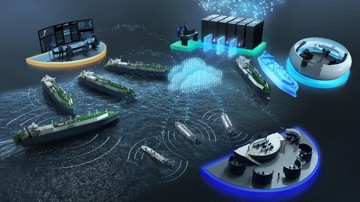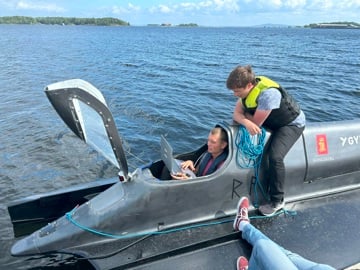
Project: Summit 2028 – Creating Results for Sailing
Join our business area Kongsberg Maritime and Olympiatoppen for a results-focused summer internship initiative, Summit2028 – Creating Results. The programme aims to lay the foundation for Norwegian medals at the 2028 Los Angeles Olympics and Paralympics through technological development.
Summit 2028 continues the collaboration established during the Paris Olympics and Paralympics in 2024, where industry sponsorship created a reliable financial framework and delivered results for ten different sports. KONGSBERG is one of the industry sponsors for both Summit 2024 and Summit 2028, and has also worked with Olympiatoppen on technical developments.
The student program Summit2028 – Creating Results for Sailing is an interdisciplinary summer project focused on technology research for sailing. It is designed for students passionate about sports technology and data science, leveraging data to support optimal decision-making in competitive sailing. This joint program places summer students at the Kongsberg office alongside Project Revolution Green participants, working closely with Olympiatoppen and the Norwegian Sailing Federation to develop impactful results.
All interns are supported by experienced mentors from Kongsberg Maritime or Olympiatoppen/Norwegian Sailing Federation who help define tasks that align with the interns' academic backgrounds and professional interests. At the end of the project, the team will present its work to the leadership of KONGSBERG, Olympiatoppen and the Norwegian Sailing Federation, together with other student project groups. The experience is both challenging and rewarding, offering an excellent opportunity to apply academic knowledge to a real-world project.
The summer internship project in 2026 will focus on building upon what the interns in 2025 have achieved. In 2025, the interns developed a Real-Time Start Line Analysis prototype using GPS trackers attached to each of the two marks that form the starting line, as well as to the bow of each sailboat. These trackers transmit GPS coordinates and speed to our backend framework, which calculates how far each boat is from the start line at the moment the race begins, along with the boats’ speeds. All these metrics and the GPS track are displayed in a dashboard, accessible via a website on the coach’s iPad.
Race Analysis: A program that collects available race data, filters for relevant information, and visualizes the results in a neutral way, prioritizing clarity. This enables sailors to see what the top competitors have done previously. By providing more information, sailors can make better decisions and feel more confident in their strategy.
We are looking for a diverse group of students to contribute to various aspects of the project. Project roles and team location may change.
Location and role(s):
Location: Lysaker, Norway
Role(s):
Data Science Engineers: Responsible for developing the race analysis program by utilizing machine learning models to process real-time sailing data and working on predictive analytics to optimize sailing strategies.
Qualifications: Background in Data Engineering, Data Science, AI, Statistics, or related field.
Skills: Python, machine learning, data analysis
Software Developer(s): Responsible for developing software and deploying it to the web. As a Software Engineer, you will collaborate closely with data scientists and engineers to ensure a seamless and intuitive user experience, integrating backend analytics with frontend components. Responsibilities include building scalable systems, ensuring data integrity, and maintaining high security and performance standards across platforms. You will also contribute to API development, system integration, and cloud deployment tasks on Azure Portal.
Qualifications: Computer Science, Software Engineering
Skills: Programming, software integration, API development, UX/UI Design; experience with both backend and frontend technologies is highly valued, particularly in frameworks such as React. Familiarity with cloud platforms like Docker and Azure DevOps, as well as knowledge of containerization, continuous integration pipelines, and DevOps practices, is an advantage.
Sensor Engineers/IoT Engineers: These team members will focus on selecting and evaluating sensors that can be installed on sailboats to collect valuable data. Their responsibilities include working with GPS systems to capture real-time sailing conditions, calibrating GPS sensors to ensure accuracy, and maintaining reliable GPS data collection despite changing weather and environmental factors.
Qualifications: Electrical Engineering, Mechanical Engineering, or related field
Skills: IoT protocols, GPS systems, sensor calibration, basic circuit design.
Application Process:
If you are passionate about engineering and sport, eager to apply your skills to create tangible results, and excited about the opportunity to work in a forward-thinking environment, we encourage you to apply. Please submit your application, including a resume and cover letter detailing your relevant experience and area of interest.
General information:
Job type: Internship
Duration: Early-June to mid-August.
Locations: Lysaker
Deadlines and internship release: The application deadline is February 28, 2026, with hiring decisions made on a rolling basis as suitable candidates are identified. Please note that project offerings may vary slightly from year to year, ensuring a dynamic and enriching experience aligned with your field of interest.

Join us in 2026: Internship application portal now open
We are pleased to announce that our portal is now open to receive applications for our 2026 Summer Internships. The application deadline is February 28, 2026.

